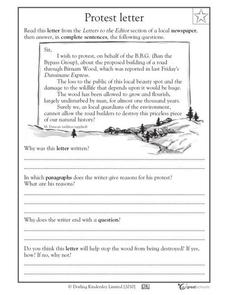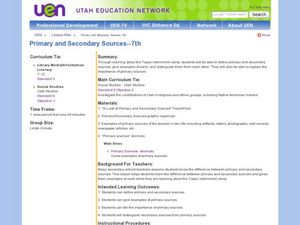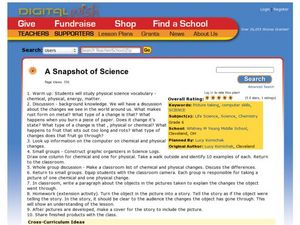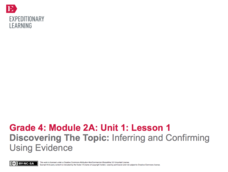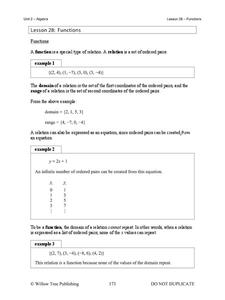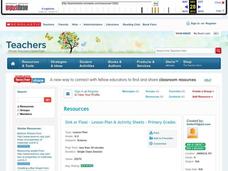Curated OER
Protest Letter
What a fantastic resource to guide youngsters in persuasive letter writing. They read a brief letter to the editor and answer question about the author's purpose, word choice, and structure. Next, scholars draft their own letter by...
Jefferson County Schools
A Canned Lesson
Follow the steps outlined in an excellent presentation to create graphic organizers and write persuasive essays with your class. The graphic organizer is effective and translates easily into a final written product. The lesson focuses in...
Curated OER
Understanding and Using Root Words to Expand Vocabulary
Middle schoolers engage in a activity which reminds them that root words indicate the base meaning of a word, and that those roots are found in many different words that have similar meanings. Pairs of pupils use construction paper and...
Curated OER
Introduction to Myths, Fables, and Legends
Middle schoolers identify elements of myths, fables, and legends as they read an example of each. After reading an example of each type of story, they list elements from each. They compare and contrast these features by...
Curated OER
Physical Science- Sink or Float?
Learners investigate which objects sink and which ones float. Learners engage in an experiment, make predictions, and record results on a graphic organizer. This is a comprehensive and easy to follow resource.
Lawrence Virtual School
Context Clues
Considering a lesson on using context clues to figure out the meaning of unfamiliar words? This packet includes a brief reading passage about strategies readers can use and 12 very different graphic organizers, including a template for a...
Curated OER
Introduction to Cause and Effect
Teach your special education students about cause and effect with this SMART board activity. After analyzing real-life examples of cause and effect -'What happens when you eat too much? What happens when you don't get enough sleep?"-...
Curated OER
Primary and Secondary Sources - 7th
A link to a beautiful Animoto presentation is included, giving examples of primary sources that a student might want to contact when doing research. Using the Topaz Internment Camp in Utah as a sample topic, middle schoolers view a slide...
Curated OER
A PICTURE IS WORTH A THOUSAND WORDS
Students compare and contrast characters from various texts and compile the collected data into several graphic organizers.
Curated OER
Writing a Character Sketch
Combining descriptive and expository writing skills, middle schoolers create a character sketch about someone they know well. They use a graphic organizer to help them discuss a model character sketch and organize/write one of their own....
Curated OER
Comprehension Instructional Routine: Sequence of Events in Text
If you're looking for a detailed lesson plan on event sequencing from informational text, you've found it. There is an entire script for you to draw from as you explore order of events and sequence words. Scaffolding is key here;...
K20 Learn
What Is It to Be Financially Literate?
What does it mean to be financially responsible? Develop a working definition of financial literacy with your classes. Using six scenarios, learners debate financially literate actions and develop a definition based on their decisions.
Curated OER
A Snapshot of Science
Sixth graders explore physical and chemical changes. In this physical science lesson, 6th graders study vocabulary, discuss the changes they see in the world and look up information on chemical and physical changes. Students create...
EngageNY
Discovering the Topic: Inferring and Confirming Using Evidence
Allow your class to figure out what they will be studying through an inquiry-based anticipatory set that involves analysis of mystery documents and practice with making inferences. The lesson plan document includes a detailed description...
Willow Tree
Functions
What makes a function a function? Learn the criteria for a relation defined as a function both numerically and graphically. Once young mathematicians define a function, they use function notation to evaluate it.
Curated OER
A President's Home and the President's House
Learners examine the differences between the White House and Monticello. In small groups, they complete a virtual tour, complete a graphic organizer, take notes during the tour, and identify activities taking place at the White House.
Curated OER
Writing Takes Shape!
Students read The Greedy Triangle and discuss geometric solids. In this geometry lesson, students list the geo-solids in the world and create a graphic organizer to show where geo-solids exist.
Curated OER
Sink or Float
Using a variety of objects, learners conduct buoyancy experiments. They make predictions on which object will sink or float and test their predictions. They use a graphic organizer to record their findings.
Curated OER
Is Perception Reality? Writing Paradoxes in Poetry
Explore the paradox of the universe - or, at least, of popular music - with this lesson. Using the songs "Inaudible Melodies" by Jack Johnson and "She" by Green Day, your class will complete a graphic organizer to help them understand...
EngageNY
Gathering Evidence and Drafting a Two-Voice Poem (Chapter 13: "Los Duraznos/Peaches")
Begin class with a short comprehension quiz and review and then move into a new genre: two-voice poems. The activity provides information about this type of poetry as well as a video example made by eighth graders that you can show your...
EngageNY
Vectors in the Coordinate Plane
Examine the meaning and purpose of vectors. Use the lesson to teach your classes how find the magnitude of a vector and what it represents graphically. Your pupils will also combine vectors to find a resultant vector and interpret its...
Curated OER
Moving to the Five Paragraph Narrative Essay
Your class just completed a graphic organizer as a prewriting strategy, but how do they take what they've recorded on their sheet and turn it into a five-paragraph essay? Help your novice writers with this 23-slide PowerPoint. An example...
Mathematics Vision Project
Module 2: Linear and Exponential Functions
Write, graph, and model all things linear and exponential. Building on the previous module in a nine-part Algebra I series, learners compare linear exponential modeling. They write equations, graph functions, and analyze key features.
Open Oregon Educational Resources
Technical Writing
Hate having to look in multiple sources to find information?Technical Writing contains all information in one book! The book covers everything from defining technical writing, giving examples of technical writing, and tips for creating...
